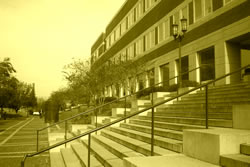|
February 16th: St. Augustine's
On Christian Doctrine
Class Business
Any business to discuss? How about the mini-rhetorical analyses?
St. Augustine's On Christian Doctrine, Books 1-4
St. Augustine (not to be confused with St. Augustine, FL), although considered to be somewhat ancient, is noted as a transition between ancient rhetoric and the Middle Ages (hey, history has to be divided somehow...). He was well-versed in the pagan rhetoric of Greece and Rome (which he mentions in On Christian Doctrine), but he converted to christianity and "was interested in rhetoric as a means of persuading Christians to lead a holy life" (Corbett, p. 549, 3rd ed.). Obviously, St. Augustine believes truth comes from the divine and believes scripture to be divinely inspired, set down by magnificent men through whom the divine speaks.
St. Augustine is an important figure in the development of scholasticism--the foundation of schooling in Western civilization. St. Augustine is one figure trying to reconcile Christian beliefs with (even more) ancient beliefs.
Book 1
The gist of Book 1 (and the Prologue) is to describe "faith at the present time" (p. 33). Here are some highlights:
- Ability to understand comes from God (Pro. sec. 8, p. 6)
- Signs and signifying
(1.2.2, p. 8)
- Using vs. enjoying (1.4.4, p. 9)
- Medicinal metaphor (1.14.13, p. 15)
- What is to be loved...(1.23. 22, p.19)
- Purity and health come from the divine (1.23.23, p. 20)
- All good comes from the divine (1.31.34, p. 27)
Book 2
The gist of Book 2 is to describe signs and their value. Here are some highlights:
- "...two reasons why things written are not understood: they are obscured either by unknown or by ambiguous signs. For signs are either literal or figurative" (2.10.15, p. 43)
- Comments on Astrology/Astrologers (2.21.32, p. 56)
- Astronomy condemned and consider fruitless (2.29.45-46, pp. 65-66)
- Social Institutions
(2.25.38+, pp. 61-63)
- "For all practices which have value among men because men agree among themselves that they are valuable are human institutions" (2.25.38, p. 61)
- "...signs are not valid among men but by consent" (2.25.38, p. 61)
- Useful institutions and gender (2.25.39, p. 62)
- "Human institutions are imperfect reflections of natural institutions or are similar to them" (2.26, p. 62)
- Institutions pertaining to reason (2.31.48, p. 67)
- Science of disputation
- Science of numbers
- The truth of valid inference comes from the divine (2.32.50, p. 68)
- "The principle that if the consequent [conclusion] is false the antecedent [premise] must also be false was not instituted by men but discovered" (2.32.50, p. 69; emphasis mine)
- Mechanical arts (2.39.58, pp. 73-74)
Book 3
The gist of Book 3 is to discuss ambiguous signs in scripture. He discusses translations and, for the most part, believes them to be accurate, but some might be mistranslated. Here are some highlights:
- Literal words rarely cause ambiguity (3.4.8, p. 83)
- Figurative words, however, are more likely to be ambiguous (3.4.9, p. 83)
- "He is a slave to a sign who uses or worships a significant thing without knowing what it signifies" (3.9.13, p. 86)
- "it is an evil of wandering error to interpret signs in a useless way" (3.9.13, p. 87)
- Polygamy vs. Bygamy (3.12.18, p. 91)
- The ancients are given passes for some practices that are condemned contemporarily
- (3.22.32, p. 98)
- "...th Scriptures: some things are taught for everyone in general; others are directed towardparticular classes of people (3.17.25, p. 94)
Book 4
In Book 4, St. Augustine finally starts discussing rhetoric. This book is concerned with teaching what one has learned about scripture and the divine. He covers deductive arguments (i.e., syllogisms), avoiding lies, and eloquence. What are some highlights?
Subdued, moderate/temperate, and grand
http://www.youtube.com/watch?v=RSwZJ55g80Q
Next Week's Reading
We're going to jump a thousand+ years and discuss Rene Descartes' Discourse on Method. Richards book should help fill in the gaps...somewhat.
|
